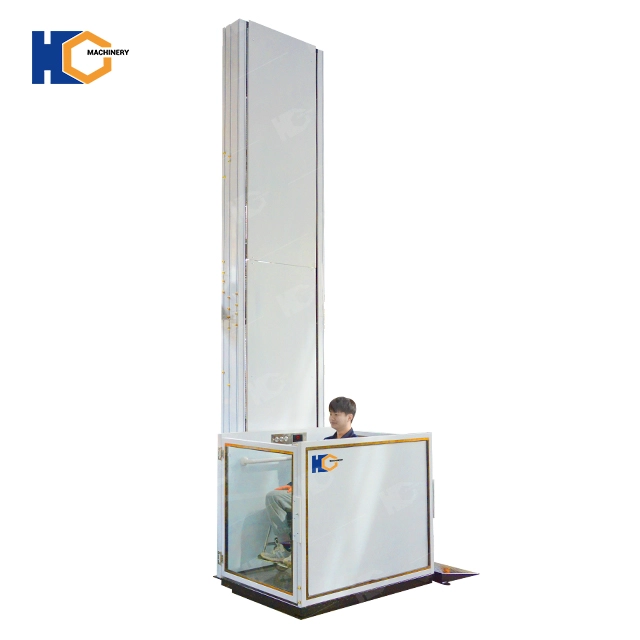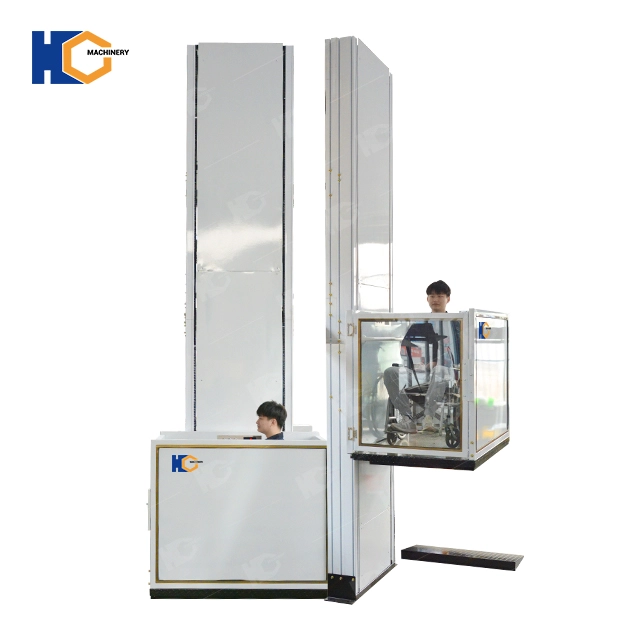Factors associated with wheelchair lift cost
The cost of a wheelchair lift is influenced by several key factors. Understanding these factors can help in making an informed decision when selecting and budgeting for a lift. Here’s a breakdown of the primary elements that affect the cost of a wheelchair lift:

1. Type of Lift
Vertical Platform Lifts (VPLs): Typically cost more due to their complex mechanisms and the ability to lift to various heights.
Inclined Platform Lifts (IPLs): Generally less expensive than VPLs but can vary based on track length and features.
Stair Lifts: Generally the most affordable option but limited to simpler staircases and lower weight capacities.
2. Lifting Height
Height Requirements: The higher the lift needs to travel, the more expensive the system will be. Custom solutions for very high lifts will further increase costs.
3. Capacity
Weight Capacity: Lifts with higher weight capacities or those designed to accommodate larger or heavier wheelchairs generally cost more. Standard capacities range from 350 to 1,000 pounds.
4. Platform Size
Dimensions: Larger platforms or those with custom dimensions to fit specific needs or spaces will increase the cost.
5. Installation Complexity
Site Conditions: Costs can vary significantly depending on the complexity of the installation site. Factors include existing structural modifications, required foundation work, or the need for custom mounting solutions.
Accessibility: If the site requires significant modifications to accommodate the lift, such as reinforcing flooring or adjusting doorways, installation costs will increase.
6. Customization
Features: Custom features such as additional safety elements (e.g., advanced sensors, emergency systems), aesthetic finishes, or specialized controls will add to the cost.
Design Modifications: Custom designs or configurations to fit unique spaces or design preferences can also increase costs.
7. Technology and Safety Features
Advanced Technology: Incorporation of advanced technologies, such as smart controls, real-time diagnostics, and remote monitoring, can raise the cost.
Safety Features: Additional safety measures, including automatic safety gates, non-slip surfaces, and backup power systems, may also contribute to the overall cost.
8. Compliance and Regulations
Building Codes and ADA Compliance: Ensuring the lift meets local building codes and regulations, including ADA compliance, may require additional modifications and increase the cost.
Permits: Obtaining necessary permits for installation can add to the overall expense.
9. Maintenance and Warranty
Maintenance Contracts: Regular maintenance is essential for the safe operation of wheelchair lifts. Maintenance contracts typically range from $300 to $1,000 annually.
Extended Warranties: Extended warranties that cover parts and labor for additional years may cost between $1,000 and $3,000.
10. Manufacturer and Brand
Reputation and Quality: Established brands with a reputation for high-quality, reliable products may charge more for their lifts. However, this often includes better customer service and warranty support.
OEM vs. Custom: Original Equipment Manufacturer (OEM) lifts may be less expensive than custom-made solutions, but custom lifts offer tailored features and designs.
When considering the cost of a wheelchair lift, it’s important to evaluate all these factors to understand the total expense involved. Each factor, from the type of lift and its capacity to installation requirements and customization options, contributes to the final price. By carefully assessing your needs and consulting with professionals, you can make an informed decision that balances functionality, safety, and budget.
Wheelchair Lifts for Home: Cost, Specifications, and Options
Wheelchair lifts are an essential home modification for individuals with mobility challenges, providing safe and easy access to different levels of a home. When considering the installation of a wheelchair lift, it’s important to understand the various specifications, types, and associated costs to make an informed decision.
Types of Wheelchair Lifts
Vertical Platform Lifts (VPLs):
Description: VPLs are elevators that move vertically between floors or to different heights, such as from the ground level to a porch or a higher floor inside the home.
Capacity: Typically, VPLs can support weights ranging from 600 to 1,000 pounds.
Lifting Height: Most VPLs can lift up to 12 feet, with some models capable of up to 14 feet.
Safety Features: These lifts often include safety gates, emergency stop buttons, non-slip surfaces, and battery backups in case of power failure.
Inclined Platform Lifts (IPLs):
Description: IPLs are installed along the staircase and move diagonally to transport a wheelchair user from one floor to another.
Capacity: Generally supports weights up to 750 pounds.
Track Length: Customizable based on the length of the staircase, typically ranging from 10 to 20 feet.
Safety Features: Includes safety belts, obstruction sensors, and emergency stop buttons.
Specifications and Pricing
Vertical Platform Lift (Standard Model)
Lifting Height: Up to 4 feet
Capacity: 750 pounds
Platform Size: 36” x 54”
Power: Standard 120V outlet
Safety Features: Non-slip surface, emergency stop, automatic safety gate
Price Range: $3,500 - $5,000
Vertical Platform Lift (Extended Height Model)
Lifting Height: Up to 12 feet
Capacity: 1,000 pounds
Platform Size: 36” x 60”
Power: Standard 120V outlet or optional 220V for higher lifts
Safety Features: Battery backup, non-slip surface, obstruction sensors
Price Range: $6,000 - $10,000
Inclined Platform Lift
Track Length: Customizable from 10 to 20 feet
Capacity: 750 pounds
Platform Size: 30” x 48”
Power: 120V outlet
Safety Features: Safety belt, obstruction sensors, folding platform
Price Range: $7,000 - $12,000
Additional Costs to Consider
Installation: Professional installation is crucial for ensuring the lift operates safely. Installation costs can range from $1,000 to $5,000 depending on the complexity of the project.
Custom Features: Customizing the lift to match home aesthetics or specific needs, such as custom platform sizes or additional safety features, can add an extra $500 to $3,000.
Maintenance and Warranty: Annual maintenance contracts can range from $300 to $600. Extended warranties are also available, often costing around $500 for an additional three years of coverage.
Total Cost Estimate
Vertical Platform Lift (Standard Model): Including installation, the total cost ranges from $4,500 to $10,000.
Vertical Platform Lift (Extended Height Model): The total cost can range from $7,000 to $15,000.
Inclined Platform Lift: Total cost, including installation, ranges from $8,000 to $17,000.
Conclusion
Investing in a wheelchair lift for the home is a significant decision that greatly enhances the quality of life for individuals with mobility challenges. While the cost varies based on the type, specifications, and additional features, understanding these elements helps in making an informed choice. Whether opting for a vertical or inclined platform lift, the combination of safety, reliability, and ease of use makes these lifts a valuable addition to any home.
Commercial Wheelchair Lift Costs: A Comprehensive Guide
Commercial wheelchair lifts are vital for ensuring accessibility in public buildings, offices, schools, and other commercial spaces. These lifts are designed to meet specific regulations and safety standards to accommodate individuals with disabilities, ensuring compliance with the Americans with Disabilities Act (ADA) and other local accessibility requirements. The cost of a commercial wheelchair lift can vary significantly based on the type of lift, specifications, installation complexity, and additional features. Below is a detailed breakdown of commercial wheelchair lift costs, specifications, and factors to consider.
Types of Commercial Wheelchair Lifts
Vertical Platform Lifts (VPLs):
Description: These lifts move vertically between floors or different heights, often used to provide access from ground level to raised entrances, stages, or multiple floors within a building.
Lifting Height: Typically up to 14 feet, though some models can reach higher.
Capacity: Commercial VPLs generally support up to 1,000 pounds.
Safety Features: Include emergency stop buttons, battery backup, non-slip surfaces, and automatic safety gates.
Inclined Platform Lifts (IPLs):
Description: Installed along staircases, these lifts transport wheelchair users diagonally from one floor to another.
Track Length: Customized based on the staircase length, usually ranging from 10 to 30 feet.
Capacity: Commonly supports up to 750 pounds.
Safety Features: Equipped with safety belts, obstruction sensors, emergency stop buttons, and folding platforms.
Commercial Stair Lifts:
Description: Similar to inclined platform lifts but designed for individuals who can transfer from their wheelchair to the lift seat.
Capacity: Generally supports up to 350 pounds.
Track Length: Customized based on the staircase, with a typical range of 10 to 20 feet.
Safety Features: Includes safety belts, obstruction sensors, and swivel seats for easy entry and exit.
Cost Breakdown
Vertical Platform Lifts (VPLs)
Lifting Height: Up to 14 feet
Capacity: 1,000 pounds
Platform Size: 36” x 60”
Price Range: $12,000 - $20,000
Lifting Height: Up to 6 feet
Capacity: 750 pounds
Platform Size: 36” x 54”
Price Range: $8,000 - $12,000
Standard Model:
Extended Height Model:
Installation Cost: $2,000 - $8,000 (depending on site conditions and lift specifications)
Inclined Platform Lifts (IPLs)
Track Length: 10 to 30 feet
Capacity: 750 pounds
Platform Size: 30” x 48”
Price Range: $10,000 - $20,000
Installation Cost: $3,000 - $7,000
Commercial Stair Lifts
Track Length: 10 to 20 feet
Capacity: 350 pounds
Seat Width: 18” - 22”
Price Range: $4,000 - $8,000
Installation Cost: $1,500 - $5,000
Additional Costs and Considerations
Customization: Custom features, such as specific platform sizes, colors, or additional safety features, can add $1,000 to $5,000 to the base price.
Permitting and Compliance: Commercial installations often require permits and adherence to local building codes, which can add $500 to $2,000 to the total cost.
Maintenance Contracts: Regular maintenance is essential for commercial lifts. Annual maintenance contracts typically cost between $500 and $1,000, depending on the lift type and frequency of use.
Extended Warranties: Many manufacturers offer extended warranties that cover parts and labor for an additional 3 to 5 years, costing between $1,000 and $3,000.
Total Cost Estimate
Vertical Platform Lifts (VPLs): The total cost, including installation, typically ranges from $10,000 to $28,000.
Inclined Platform Lifts (IPLs): Including installation, the total cost usually ranges from $13,000 to $27,000.
Commercial Stair Lifts: The total cost, including installation, generally ranges from $5,500 to $13,000.
Conclusion
Investing in a commercial wheelchair lift is crucial for ensuring accessibility and compliance with legal requirements. The cost can vary widely depending on the type of lift, specifications, and installation needs. By understanding the options and associated costs, businesses and organizations can make informed decisions that enhance accessibility and safety for all users.
About JNHC lift
JNHC: Leading Manufacturer of Home and Commercial Wheelchair Lifts from China
JNHC is a distinguished manufacturer based in China, specializing in high-quality home and commercial wheelchair lifts. With a strong commitment to accessibility and innovation, JNHC delivers cutting-edge solutions designed to enhance mobility and ensure compliance with the latest safety standards.
Comprehensive Product Range: JNHC offers a wide array of wheelchair lifts, including vertical platform lifts (VPLs), inclined platform lifts (IPLs), and commercial stair lifts. Our products cater to various needs, from residential settings to complex commercial applications.
Custom Design and Manufacturing: We pride ourselves on our ability to provide customized solutions. Our skilled design and engineering teams work closely with clients to develop tailored lifts that meet specific requirements and preferences.
Advanced Technology and Safety: Equipped with the latest technology and adhering to stringent safety standards, JNHC wheelchair lifts ensure reliable and secure operation. Features such as emergency stop buttons, safety gates, and obstruction sensors are standard in our products.
High-Quality Manufacturing: Utilizing state-of-the-art manufacturing facilities, we produce wheelchair lifts that are durable, efficient, and built to withstand the demands of daily use. Our commitment to quality is reflected in the rigorous testing and quality control processes we employ.
OEM and Private Label Services: JNHC provides OEM and private label services, allowing businesses and organizations to offer our wheelchair lifts under their own brand. We support partners with flexible manufacturing options and comprehensive support.
Global Reach and Customer Support: Serving clients worldwide, JNHC is dedicated to delivering exceptional customer service. From pre-sales consultation to after-sales support, our team is committed to ensuring complete satisfaction and smooth operation.
At JNHC, our mission is to improve accessibility and independence for individuals through innovative and reliable wheelchair lift solutions. Whether for home or commercial use, our products are designed to enhance mobility, safety, and convenience.

922.webp)
660.webp)
734.webp)